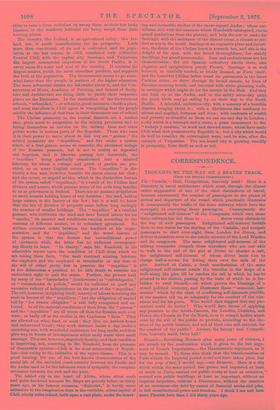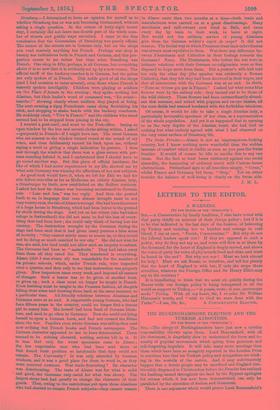CORRESPONDENCE.
THOUGHTS BY THE WAY ON A BEATEN TRACK. Taos ma SPROUL CORRESPONDS/U.1
The 'Castalia:—Hail, Competition, heavenly maid ! Here is a discovery in naval architecture which must, through the almost entire suppression of one of the chief discomforts of travel, increase enormously the number of passengers to the places of arrival and departure of the vessel which practically illustrates it, consequently the traffic of the three railways which have the monopoly of conveying those passengers. Consequently, the " enlightened self-interest" of the Companies which own those
three railways-has led them to throw every obstacle in the way of such passengers. Enlightened self-interest forbids them to run trains for the starting of the Castalia,' and compels passengers to start over-night from London for Dover, and deliver themselves over to the tender mercies of the Lord Warden and its congeners. The same enlightened self-interest of the railway companies compels those travellers who are not able to walk to the end of the pier at Dover to charter a cab, the enlightened self-interest of whose driver leads him to- charge half-a-crown for jolting them over the rails of the pier. Arrived at Calais, a fresh manifestation of the same enlightened self-interest awaits the traveller in the shape of a walk along the pier, till he reaches the cab in which he has to proceed to the station, passing by the train of which he is for- bidden to avail himself,--all which proves the blessings of a sound political economy, and illustrates those " economic har- monics" which by the clash of conflicting self-interests provide, as our masters tell us, so admirably for the comfort of the con- sumer and for his purse. Who would dare suggest that any pre- concert could do better ? Who would dare dream of applying any pressure to the South-Eastern, the London, Chatham, and Dover, the Chemin de Fer du Nord, so as to compel bodies which exist by the will of the public to provide, according to the dic- tates of the public interest, and not of their own self-interest, for the comfort of the public ? Avaunt, the heresy ! hail, Competi- tion, heavenly maid, twice hail !
Brussels.—Revisiting Brussels after many years of absence, I am struck by the confutation which it gives to the last argu-
ment of French Imperialism,—the Haussmannic argument, as it may be termed. To those who think that the transformation of
Paris within the Imperial period could not have taken place but for the coup d'itat, I would say,—see Brussels. Here is a city which within the same period has grown and improved at least as much as Paris, carried out public works at least as extensive,-
erected new public buildings at least as important, without an imperial despotism, without a Haussmann, without the creation of an enormous city debt by means of financial tricks and jobs, in full constitutional peace and freedom. I think I see and hear more Flemish here than I did thirty years ago. Strasburg.—I determined to form an opinion for myself as to whether Strasburg was or was not becoming Germanised, without asking a single question. In the course of forty-eight hours' stay, I certainly did not leave one-fourth part of the whole num- ber of streets and public ways unvisited. I came to the firm conclusion that the Germanism of Strasburg was purely official. The names of the streets are in German only, but on the shops you read scarcely anything but French. Perhaps one shop in twenty has indications both in French and German, and this pro- portion seems to me rather less than when Strasburg was French. One shop in fifty, perhaps, is all German, but everything about it is so new that it is evidently set up by a new-comer. The official tariff of the hackney coaches is in German, but the prices are only spoken of in French. This holds good of all the shops (and I had occasion to enter several), even those where French is scarcely spoken intelligibly. Children were playing at soldiers on the Place d'Armes in the evening ; they spoke nothing but Alsatian, but their leader's word of command was, "En avant- marche !" showing clearly whose soldiers they played at being. The next evening a tipsy Frenchman came along flourishing his stick, and stopping to shake hands with the hackney coachmen. He suddenly cried, " Vive la France!" and the children who stood around had to be stopped from joining in the cry.
I wanted a post-card, and went to the Post-office. Seeing an open window by the box and several clerks sitting within, I asked —purposely in French—if I might have one. The stout German who sat nearest to the window turned round at the sound of my voice, and then deliberately turned his back upon me, without saying a word or giving a single indication by gesture. I then saw through the window that there was a glass screen with per- sons standing behind it, and I understood that I should have to go round another way. But this piece of official insolence, the like of which I had never experienced in my life, showed me by what acts Germany was winning the affections of her new subjects.
As good-luck would have it, when we left for Bale we had for sole fellow-traveller as far as Mulhouse an elderly Alsatian lady, a Strasburger by birth, now established on the Belfort territory. I asked her how far Alsace was becoming accustomed to German rule. " Less and less," was her reply. And then she poured forth to us, in language that once almost brought tears to not very watery eyes, the tale ofAlsace's wrongs. She bad been the owner of a large house in Strasburg, which had been burnt to the ground by shells during the siege. And yet on her return (she had taken refuge in Switzerland) she did not seem to feel the loss of every- thing that had been hers ; she could only think of having lost her country. The destruction wrought by the Germans during the siege had been such that it bad given many persons a false sense of security ; "they cannot surely mean to annex us, or they would not be doing so much mischief to our city." She did not wish for war, she said, but God could not allow such an iniquity to subsist. The Germans had been so " maladroits." They had taken away from them all they cared for. They interfered in everything. Aimee (this I was aware of) was remarkable for the number of its private schools, which, under French rule, were inspected once a quarter, and then only to see that instruction was properly given. Now inspectors came every week, and imposed all manner of changes. Such a lesson was to be given at another hour, or given up ; such a class must no longer be taught in French. Even knitting must be taught in the Prussian fashion, all the girls lifting their arms and drawing them back at the same moment, to a particular time. All friendly relations between Alsatians and Germans were at an end. A respectable young German, who had been fifteen years in the country, could no longer find a decent girl to marry him. She herself had been fond of German litera- ture, and used to go often to Germany. Now she could not bring herself to open a German book, and had not crossed the Rhine since the war. Families even where German was still spoken read now nothing but French books and French newspapers. The German character appeared to her to have deteriorated. There seemed to be nothing elevated, nothing serious left in it. It is true that only the worst specimens came to Aimee ; the few respectable men who had been sent there at first found their position so intolerable that they could not remain. The University? It was only attended by German students, and it was a good place for them to work in, as they were received nowhere. Was trade flourishing ? Its character was deteriorating. The taste of Alsace was for what is solid and good, the Germans only cared for what was showy. The largest shops had had greatly to change the character of their goods. Then, owing to the restrictions put upon those Alsatians Who had elected to remain French subjects—they cannot remain in Alsace more than two months at a time—both trade and manufactures were carried on at a great disadvantage. Many merchants and mill-owners now lived in Bale, and came every day by train to their work, to leave at night. But would not the military service of young Alsatians give them the German soldier's esprit de corps? It did not seem so. The brutal way in which Prussians treat their subordinates was always most repulsive to them. Was there any difference be- tween Protestants and Catholics in their feelings towards the Germans ? None. The Protestants, who before the war were in intimate relations with their German co-religionists, were at first disposed to hope more from them. But a pasteur's wife had told her only the other day (the speaker was evidently a Roman Catholic), that they felt they had been deceived in their hopes, and that all intercourse with the Germans was at an end. In short, " Nous ne vivons que par la France." I asked her what some blue flowers were by the railway side ; they turned out to be those of the wild chicory. These flowers had been extraordinarily abund- ant this summer, and mixed with poppies and ox-eye daisies, all the corn-fields had seemed bordered with the forbidden tricolour.
Of course, it would be idle to take a single Alsatian lady, a particularly favourable specimen of her class, as a representative of the whole population. And yet it so happened that in opening to us the very depths of the Alsatian heart, she had told us nothing but what entirely agreed with what I had observed on the very outer surface of Strasburg life.
The Swiss Frontier.—Alsace is not an unprosperous-looking country, but I know nothing more wonderful than the sudden increase of comfort which is visible as soon as you pass the Swiss frontier. It would of course be idle to ascribe this to any one cause. But the fact at least bears testimony against one social absurdity, the hampering of ordinary travel with Custom-house obstructions. Switzerland says to all travellers simply, " Come," whilst France and Germany bid them, " Stop." Yet on either frontier the balance of well-being is clearly on the Swiss side.
J. M. L.



































 Previous page
Previous page